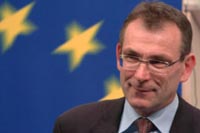Russia to wait for expert advice before deciding on new energy rules

Before deciding whether new EU energy rules targeted state-owned natural gas monopoly JSC Gazprom Russia will wait for expert advice on how they would work, the European Union's energy chief said Tuesday.
The EU is threatening to ban foreign predators from its gas and electricity markets unless they join European businesses in separating their supply operations from infrastructure, such as pipelines and power grids.
This could force some companies to cast off their transmission operations. By insisting that this also apply to non-EU firms, the rules seem to take aim at Gazprom, which supplies 25 percent of Europe's gas and already has acquired stakes in EU energy companies.
After talks with Russia, EU Energy Commissioner Andris Piebalgs said Russian Energy Minister Viktor Khristenko had agreed not to take a firm position on Europe's draft rules until a group of experts had looked at the details.
"As usually all the difficulties come into detail ... the minister said that he would very much welcome this consultation at expert level that will clearly identify 'are there issues, what type of issues' and only then will the minister take his political position," Piebalgs said.
Khristenko told reporters that Russia wanted to actively consult with Europe on new energy initiatives, calming the waters by saying they share common goals.
"We all agree on one objective and that is we want to ensure security of energy supply. We want to ensure predictability which will allow for sustainable development," he said.
EU regulators want to separate energy network and supply businesses, saying this would be the best way to ensure fair competition and allow new rivals to challenge entrenched national monopolies.
Non-EU companies must "comply with the same unbundling requirements as EU companies," a European Commission report stated last month. It proposed that non-EU companies can buy all or part of an electricity or gas transmission network only if its home country signs a treaty with the EU in which it commits to return the favor of free market access.
The EU executive said that the control huge energy companies have over the supply chain gives them an inherent interest in limiting new investment that would benefit competitors. It said billions of euros (dollars) were needed to upgrade Europe's energy grid, connecting fragmented markets and preventing power blackouts or gas shortages.
The plan to split up energy businesses needs the backing of the European Parliament and EU's 27 governments - which can make changes before it comes into force.
Half a dozen nations, led by France and Germany, reject unbundling energy companies, although it is endorsed by Britain, the Netherlands, Denmark, Belgium, Finland, Romania, Spain and Sweden.
Subscribe to Pravda.Ru Telegram channel, Facebook, RSS!





